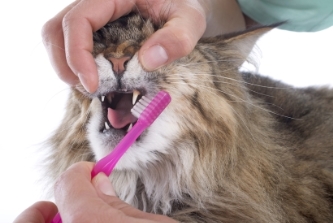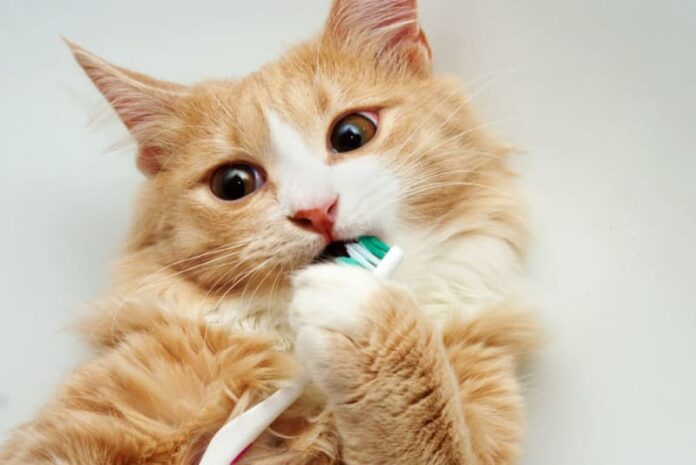Last Updated on February 7, 2024 by Dog Lover
Facts About Cats’ Teeth: Keeping Your Feline Smile Healthy
When it comes to our feline friends, their dental health is often overlooked. But just like humans, cats require proper dental care to maintain a healthy smile.
In this article, we will explore some fascinating facts about cats’ teeth and provide you with essential tips to keep your furry companion’s dental hygiene in top shape.
Our feline companions may not flash pearly whites like us humans, but their dental health is just as crucial to their overall well-being. From those tiny needle-like incisors to the powerful carnassial teeth, each plays a vital role in your cat’s ability to eat, groom, and even defend themselves.
But how much do you know about cat teeth and how to keep them sparkling clean and healthy? Buckle up, cat lovers, because we’re diving deep into the fascinating world of feline dentistry!
Beyond the Cuteness: Understanding Your Cat’s Dental Anatomy
Cats boast 30 permanent teeth – 16 in the upper jaw and 14 in the lower. These specialized chompers come in four different types:
- Incisors: The four sharp front teeth used for nibbling and grooming.
- Canines: The prominent “fang” teeth for tearing and gripping prey.
- Premolars: Four on each side, used for shearing and crushing food.
- Molars: Two on each side, responsible for grinding food into smaller pieces.
Just like in humans, plaque and tartar buildup can wreak havoc on your cat’s teeth. This buildup harbors bacteria that can lead to gingivitis, inflammation, and even painful periodontal disease. Ouch! So, how can we prevent this and keep our furry friends smiling wide?

Understanding Your Cat’s Teeth
Did you know that adult cats have 30 teeth, while kittens have 26? These teeth serve various purposes, from tearing and cutting food to chewing and grinding. Cats have sharp, pointy teeth at the front of their mouths, known as incisors, which are used for gripping and nibbling. Behind the incisors, you’ll find the canines, which are designed for tearing flesh. Further back in the mouth, cats have premolars and molars that aid in chewing and grinding their food.
The Importance of Dental Care
Proper dental care is crucial for your cat’s overall health and well-being. Dental issues can lead to pain, discomfort, and even more severe health problems if left untreated. Regular dental check-ups, professional cleanings, and a good oral hygiene routine at home can help prevent dental diseases and ensure your cat maintains a healthy smile.
Signs of Dental Problems
It’s essential to be aware of the signs that may indicate dental issues in your cat. Watch out for symptoms such as bad breath, swollen or bleeding gums, difficulty eating, excessive drooling, and a reluctance to play with chew toys. If you notice any of these signs, it’s time to consult your veterinarian for a thorough dental examination.

Tips for Maintaining Your Cat’s Dental Health
1. Brushing: Yes, you read that right! Cats can benefit from regular brushing, just like humans. Use a soft-bristled toothbrush and specially formulated cat toothpaste to gently brush your cat’s teeth. Start slowly and make it a positive experience for your feline friend.
2. Dental Treats and Toys: There are various dental treats and toys available that can help keep your cat’s teeth clean. Look for products that are designed to promote dental health and reduce plaque and tartar buildup.
3. Balanced Diet: Providing your cat with a balanced diet that includes proper nutrients can contribute to their dental health. Consult your veterinarian for advice on the best diet for your cat’s specific needs.
4. Regular Check-ups: Schedule regular dental check-ups with your veterinarian. They can identify any dental issues early on and recommend appropriate treatment.
FAQs About Cats’ Teeth
Can I use human toothpaste for my cat?
No, human toothpaste can be toxic to cats. Always use toothpaste specifically formulated for feline dental care.
How often should I brush my cat’s teeth?
Ideally, you should aim to brush your cat’s teeth at least three times a week. However, even brushing once a week can make a significant difference.
Are there any natural remedies for maintaining my cat’s dental health?
While some natural remedies may help, such as dental gels or water additives, it’s essential to consult your veterinarian before using them to ensure they are safe and effective for your cat.
Can dental issues in cats lead to other health problems?
Yes, dental issues can contribute to other health problems, including heart disease and kidney disease. Maintaining your cat’s dental health is crucial for their overall well-being.
Are certain cat breeds more prone to dental issues?
Some cat breeds, such as Persians and Siamese, may be more prone to dental issues. However, dental care is essential for all cats, regardless of their breed.
Remember, taking care of your cat’s dental health is an investment in their overall well-being. By following these tips and being proactive about their dental care, you can ensure your feline friend maintains a healthy and happy smile for years to come.
Sources:
1. American Veterinary Dental College. “Feline Dental Care.” https://www.avdc.org/AFD/feline.html
2. The Humane Society of the United States. “How to Brush Your Cat’s Teeth.” https://www.humanesociety.org/resources/how-brush-your-cats-teeth
3. Cornell Feline Health Center. “Dental Disease in Cats.” https://www.vet.cornell.edu/departments-centers-and-institutes/cornell-feline-health-center/health-information/feline-health-topics/dental-disease-cats























